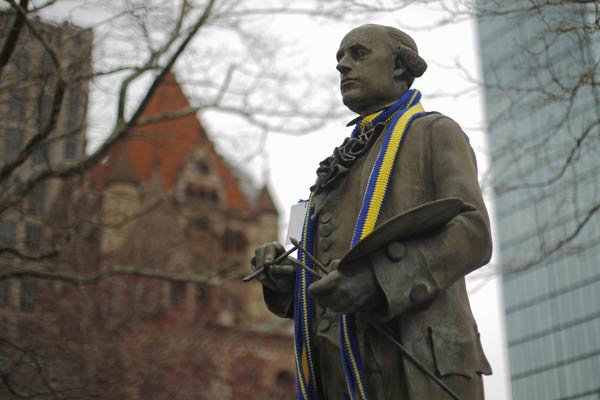Boston sees tourism boost in wake of marathon bombing
|
A statue of painter John Singleton Copley wears a blue and yellow Boston Marathon scarf near the race's finish line in Boston, Massachusetts. The 118th running of the Boston Marathon will be held on Monday. Brian Snyder / Reuters |
With an expanded field of runners and the memory of last year's bombings elevating interest in one of the world's great races, the 2014 Boston Marathon could bring an unprecedented wave of visitors and an influx of tourism dollars to the area.
Race organizers, in the aftermath of the twin bombings that killed three spectators and injured more than 260 people, expanded the field of runners by 9,000, to nearly 36,000. The majority - more than 21,000 - hail from US states outside of New England. Another 5,330 or so will come from more than 70 foreign countries. The rest will come from Massachusetts and surrounding states.
More spectators are also expected to line the 26.2-mile course, which starts west of Boston in Hopkinton and ends downtown on Boylston Street. About 500,000 spectators typically line the race route; this year, officials estimate the crowds might exceed a million on Monday.
Patrick Moscaritolo, president of the Greater Boston Convention and Visitors Bureau, expects the marathon will generate more than $175 million in economic activity over about five days. That is up from previous year projections of $130 million to $140 million.
"This is not a one-day race," Moscaritolo said. "It has never been, and I think this year it will be far from that ... for all sorts of reasons, people are coming out, and they want to stand with the runners and make a statement of support."
Despite the likely economic boon, local businesses are not focused on the bottom line, officials say.
"It is hard to talk about it in dollars and cents, because people's lives have been lost," Moscaritolo said.
"The bottom line is that people had promised this race would come back bigger and stronger than ever before and, by the looks of it, that is going to be the case."
One clear sign of how busy the Boston area is expected to be is the pace for hotel bookings. Officials say this year's demand has been the strongest since perhaps the race's centennial in 1996.
Moscaritolo estimated last week that the occupancy rate in the 23,000 or so hotel rooms in Boston and Cambridge was at nearly 90 percent. That is up from about 83 to 84 percent for previous marathons, said Moscaritolo, adding there are still plenty of options for last-minute travelers, with about 27,000 more hotel rooms elsewhere in Greater Boston.
Officials at Marathon Tours and Travel, the official travel agency for the Boston Athletic Association, which organizes the race, say they are working with hotels south and west of the city to help meet demand.
"Most of the time, we are usually looking at hotels toward the finish line because people want to finish the race and get right back to their room," said Kelly McLay, the company's sales and marketing manager. "But this year, we've seen an extension to ones along the course route."



















